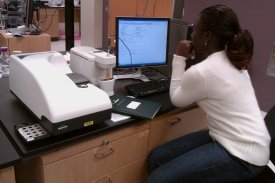While viruses are so often seen as the enemy, modern scientific techniques may soon be able to harness the strengths of a virus for drug delivery systems that are designed to treat diseases, rather than cause them. Using a Zetasizer Nano particle characterization system from Malvern Panalytical, researchers at Indiana University's (IU) Molecular and Cellular Biochemistry Department have been studying self-assembled virus-based drug delivery systems that can be tuned to a particular size enabling the uptake of specific functional cargo.
Dr Stella Aniagyei, post doctoral research associate at the IU's Molecular and Cellular Biochemistry department explains: "Viruses tend to be nanosized, symmetrical and structurally consistent with a narrow size distribution. Despite this apparent biological simplicity, viruses are extremely good at delivering their own genome to living biological tissue. This makes them a prime target for biological engineers looking for an efficient transportation device that will deliver drug directly to infected cells."

"Here at IU's Nanocharacterization facility, the Malvern Panalytical Zetasizer Nano is the 'go to' instrument for characterization of assembled product," said Dr Aniagyei. "Structures closely resembling virus give a narrow size distribution. If they don't, then we know the process has gone off the biological path. We are currently looking at aggregation limits to move towards defining optimum ionic conditions for the assembly of nucleic acid binding to Gag proteins [one of the nine genes in the retrovirus RNA genome]."
Malvern Panalytical's Zetasizer range uses light scattering techniques to measure hydrodynamic size, zeta potential and molecular weight of proteins and nanoparticles. According to Dr Aniagyei, "Malvern Panalytical's Zetasizer Nano is very useful for protein characterization. The ease with which it can be used makes it the perfect instrument for the student environment. It definitely is one of the easiest instruments I've had to work with."
Indiana University (IU) is already in the spotlight having just received $900,000 from the Ovarian Cancer Research Fund, or OCRF, to help them prepare the new drug SGI-110 for clinical trials in patients whose once-thwarted ovarian cancer has returned. However, this work is not the only IU project at the cutting edge. Established on July 1 2009, the Department of Molecular and Cellular Biochemistry was the first science department created on the Indiana University Bloomington campus in 33 years. Linking biology, chemistry, and medical sciences, the department's main focus is on the priority areas of structural virology and virus assembly.